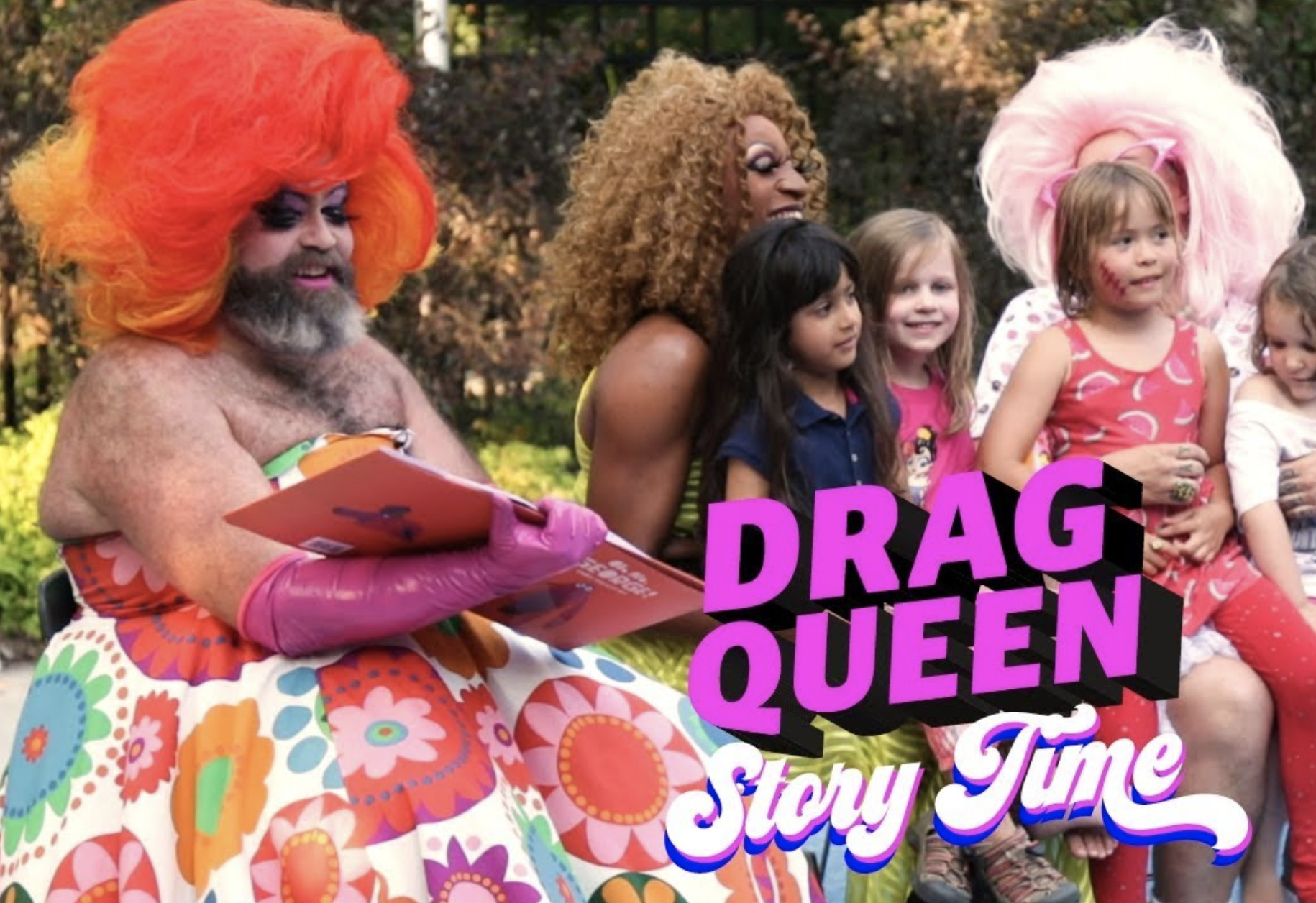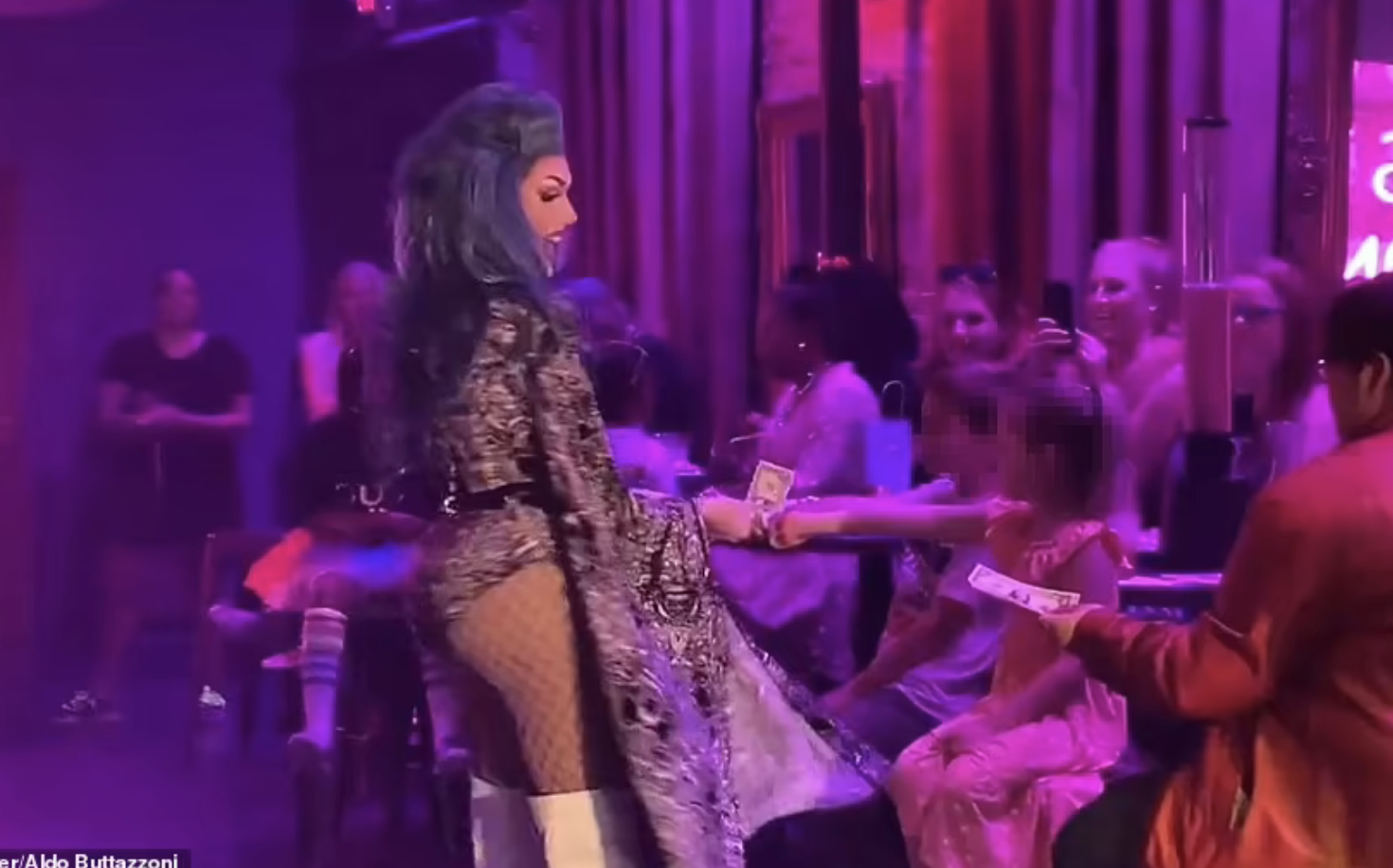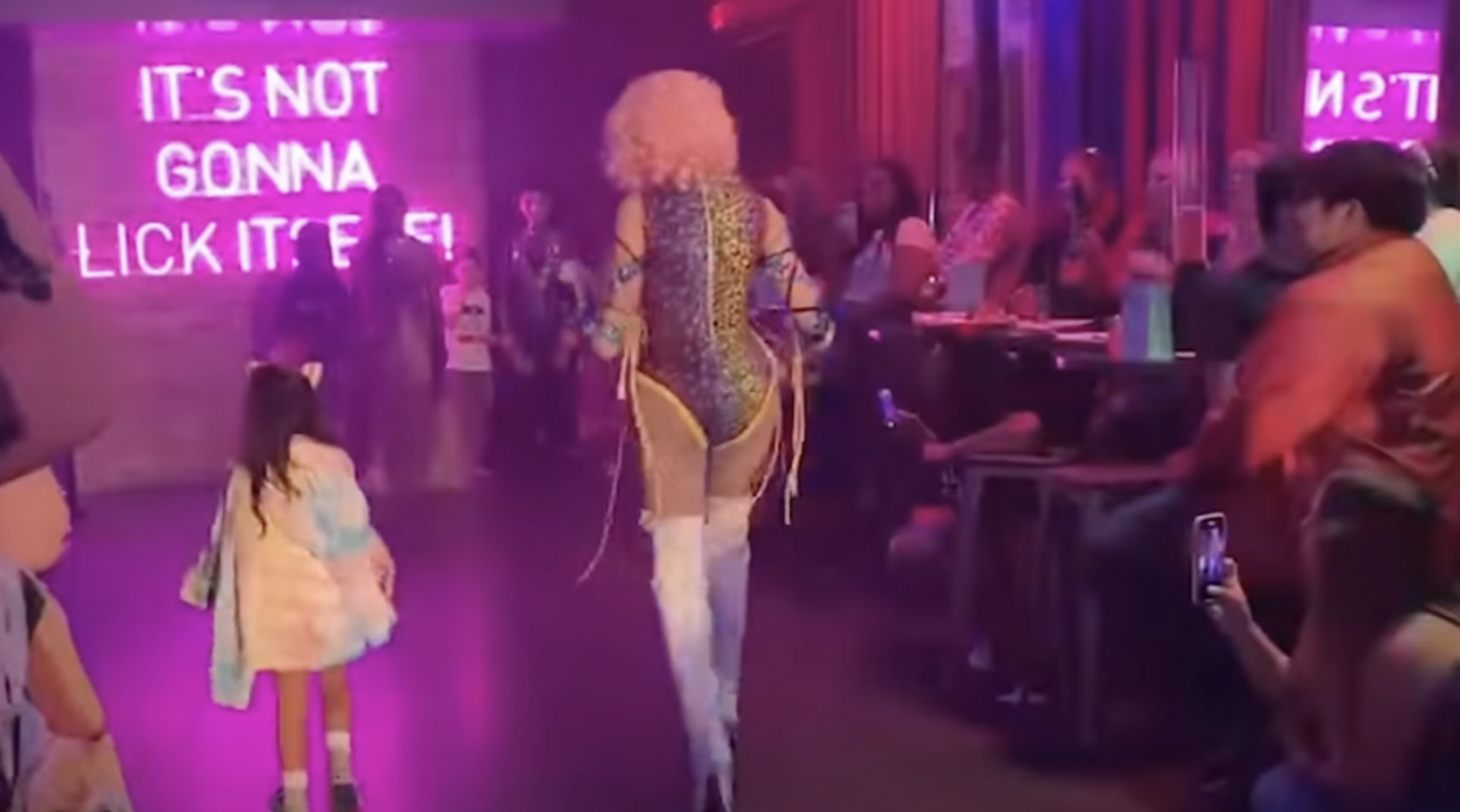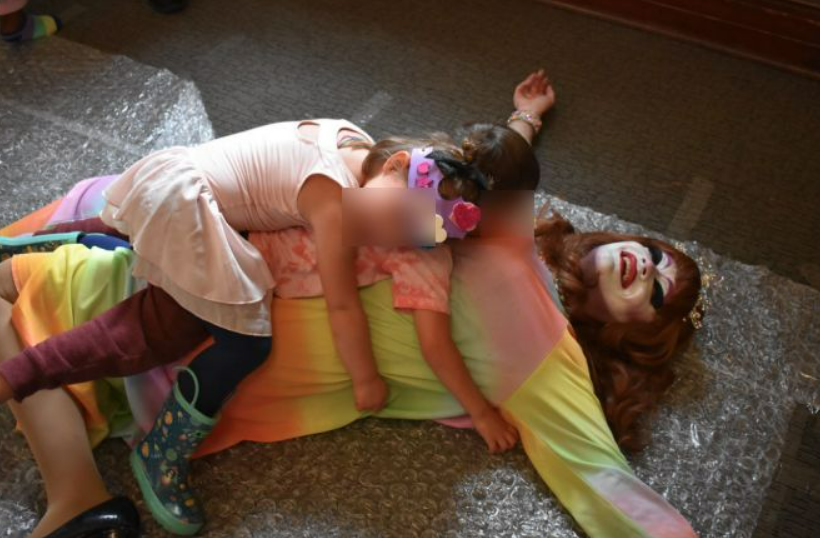
Making children vulnerable to adult predators is something most would like to avoid, but you wouldn’t know it judging by the actions of Canadian politicians, policymakers, librarians, school staff, and some parents. Misguided adults — believing themselves to be engaging in fun, progressive entertainment — are failing to safeguard children across North America by exposing them to drag culture.
“Drag Queen Story Hour” (DQSH) became a regular event at North American libraries, schools, and bookstores beginning in 2015. The drag queens — all men dressed up as clownish versions of “women” — read stories to children under the guise of normalizing “gender fluidity” and giving kids “glamorous, positive, and unabashedly queer role models.” DQSH has chapters in 29 states, as well as in Canada, Mexico, Japan, Australia, Germany, Sweden, and Denmark. Drag story time events have become incredibly popularized, expanding beyond DQSH — a library in Saint John, New Brunswick held its own version of drag story time earlier this month, and the Toronto Public Library hosted a “Drag Queen Family Storytime” on June 18. Even small coastal towns like Sechelt, B.C. have caught on, where a Drag Queen Storytime took place over the weekend.
Lumped under the LGBTQ umbrella, DQSH claims to “celebrate diversity,” but what are children really being taught to accept? We are talking about adult men performing (really, mocking) femininity — often in provocative, sexualized costumes — the kind women don’t typically wear, certainly not when invited to read to children.
Drag queens and drag culture tend to be hypersexualized, mimicking strippers in revealing costumes; portraying exaggerated, objectified “women;” performing sexualized dances; and using explicit language throughout. Needless to say, drag is inappropriate for children. Those not indoctrinated into modern woke culture likely have an inherent discomfort upon seeing children engaging with drag culture and many have expressed concerns that normalizing drag shows for children facilitates pedophilia by “grooming” children to accept the hypersexualized behaviour and appearances of men. In a conversation with conservative commentator, Todd Starnes, U.S. Rep. Matt Rosendale (R-Montana) said:
“I’m sorry, this is a classic example of grooming these children and having them have discussions about sexuality that they should not be exposed to. And anyone that thinks that is somewhere short of child abuse is wrong. It’s very close to pedophilia as far as I’m concerned.”
These concerns are often framed as “anti-LGBTQ” or dismissed as hysteria from the Christian right. But there is validity to the fact that children who are led to view sexual perversions and hypersexualized behaviour from men as normal are easier targets for pedophiles.
Child sexual abuse is a serious problem in Canada, as well as around the globe. This year, Statistics Canada reported that between 2014 and 2020, the overall rate of online child sexual exploitation and abuse more than doubled. A 2017 Juristat report on police-reported crime statistics in Canada found that “[a]lthough the rate of police-reported violent crime declined overall, violent violations which experienced an increase in rate [included] sexual violations against children (+30 per cent)…” There are almost daily news reports of child sexual abuse, and many men openly advocate for the normalization of pedophilia, framing it as simply another sexual identity, akin to being gay.
What’s needed is more child safeguarding — not less. Yet those who express concerns about exposing children to drag culture and teaching them to accept adult men performing sexuality are accused of bigotry, as well as homophobia and “transphobia.” The presumption that those raising concerns are homophobic ignores the fact that there are feminists opposed to normalizing drag for children, who are vocally pro-gay/pro-lesbian.
The problem is that the LGBTQ umbrella has expanded to such an extent it now shelters men who wish to express their sexual fetishes publicly, which is not something only right-wing Christians are troubled by.
British journalist, Jo Bartosch, who has written for numerous publications, including Lesbian and Gay News, The Critic, and feminist website, 4w, raised concerns in her 2020 Spiked article, “Drag Queen Story Time is not okay.” She writes:
“DQST claims to offer ‘queer role models’ to children. But despite the popularity of its events, it remains unclear how a man in a lurid frock will make kids with two mums feel supported, or how DQST serves to stop the bullying of kids who don’t conform… DQST is a sinister attempt to force an adult ideology on to children.”
Proponents of these kinds of events seem to believe it is important for children to have “queer” role models. And while kids should learn it is okay to be gay, the term “queer” has become nebulous. “Queer” used to mean strange, eccentric, or homosexual, but in recent years has come to refer to anything from polyamorous to trans-identified to various sexual fetishes. We now see “furries” and men who practice BDSM at Pride, their sexual proclivities on full display under the “queer” umbrella.
The words “gay” and “homosexual” are not difficult to define — they simply mean same-sex attracted. And normalizing homosexuality in society is a good thing, but drag performances for children are not about (appropriately dressed) lesbians and gays reading to children — rather, they are about hyperfeminized, hypersexualized, cross-dressing men. Children don’t need to know about the sexual interests or “gender identities” of adults — indeed, storytime need not be politicized to reflect adult virtue signalling.
Given that drag is clearly adult entertainment, it is worth asking ourselves why child safeguarding practices have gone out the window when it comes to drag culture.
Even drag queens have cautioned parents about exposing their children to drag culture. In 2021, drag queen Kitty Demure had a message for parents who take their children to Drag Queen Story Hour:
“I have no idea why you want drag queens to read books to your children… What in the hell has a drag queen ever done to make you have so much respect for them and admire them so much? Other than put on makeup and jump on the floor and writhe around and do sexual things on stage? I have absolutely no idea why you would want that to influence your child. Would you want a stripper or a porn star to influence your child? … A drag queen performs in a nightclub for adults. There is a lot of filth that goes on, a lot of sexual stuff that goes on. And backstage there’s a lot of nudity, sex, and drugs… So I don’t think this is an avenue you would want your child to explore… But to actually get [your children] involved in drag is extremely, extremely irresponsible on your part.”
He also criticized bringing children to Pride events, saying “they don’t belong there.”
“There’s a lot of adult activity that is going on at the gay Pride events and in the nightclubs. And I think it’s just irresponsible. I don’t understand how parents allow it… There’s lots of drugs, alcohol, sex, nudity, you name it, in the gay nightclubs — they’re all like that. Children should not be a part of this culture.”
Why is this practice suddenly so popularized and why are adults going along? Drag performances feature everywhere from farmer’s markets to elementary schools — sometimes without parental knowledge or consent.
Earlier this month, Dallas parents took their children to “Drag the Kids to Pride Drag Show” at Mr. Misster, a gay bar with a neon sign inside reading, “IT’S NOT GONNA LICK ITSELF!” A handful of children were invited to strut down the walkway and “strike a pose,” led by the drag queens. Videos of the event show children handing money to drag queens in sexualized costumes, dancing provocatively as though they were strippers.
My generation was told not to talk to strangers — today, children are encouraged to engage in sexy performances with adults.


Drag has now been fully mainstreamed. Speaker of the House, Nancy Pelosi, appeared on RuPaul’s Drag Race All Stars earlier this month and tweeted about it. On the show she said, “It’s my honour to be here, to say to all of you how proud we all are of you. Thank you for the joy and beauty you bring to the world.” RuPaul’s Drag Race, a reality TV show about men who compete against each other to become the next drag superstar, judged by America’s most famous drag queen, RuPaul, is not only in its 14th season and winner of Emmy awards, it has become a franchise with spin-offs and international versions, including a Canadian one.
But drag hasn’t just been normalized as adult entertainment. In 2019, the CBC featured Drag Kids, a documentary following four kids who dream of being drag queens, and prepare to compete in an all ages drag show at Montreal Pride. The kids are hypersexualized in heels and makeup, encouraged by their parents — some of whom label their children “queer.”
This year, the CBC’s French streaming platform released a musical children’s TV series called Barbada, hosted by drag queen Barbada de Barbades (Sébastien Potvin). In the first episode, musical guest, Klô Pelgag, sings the lyrics, “germent au coeur des idées érotiques,” which translates to “germinating erotic ideas in the heart,” and in episode two Guylaine Tanguay sings, “Il m’a appris à yodeler et comment faire l’amour” (“He taught me how to yodel and make love”). Growing up, I watched many popular children’s TV shows, including Sesame Street, The Polka Dot Door, and Passe-Partout, and don’t recall any mention of “erotic ideas” or men teaching women about lovemaking.
Last year, Disney+ aired This is Me: Pride Celebration Spectacular, a concert hosted by “Drag Artist and LGBTQ+ Advocate” Nina West (Andrew Levitt). The 43-year-old, who refers to himself as a girl, is joined by beloved muppet Kermit the Frog, as well as other drag queens, like Jackie Cox (Darius Rose), who perform children’s songs from Beauty and the Beast and The Little Mermaid.
Netflix series, AJ and the Queen, couples a drag queen named Ruby Red (played by 60-year-old RuPaul) with a 10-year-old girl named AJ (Izzy G.), who travel across the United States together in an RV for Ruby’s cross-country drag tour. Ruby Red/Robert is portrayed favourably, as patient, level-headed, and generous — the Mr. Rogers of drag. AJ is repeatedly exposed to sexualized behaviour and speech, as characters say things like, “Half my girlfriends have penises” and “Girl, we gonna take the Hershey highway [a reference to anal sex] — if you were older, you’d love that.” A gay policeman talks about hooking up with a man in front AJ, saying, “Sorry, not great language for a kid.” Robert responds, “Her? She’s 50.” This series, similar to others featuring drag queens, grooms viewers not to see this as inappropriate. Apparently drag makes adult men inherently safe and trustworthy.

Last year, child drag superstar, Desmond Napoles (aka Desmond is Amazing), was featured in the TV special Stonewall Inn Safe Spaces Concert. He wore makeup, heels, a short sequined dress, and a skin-tight outfit exposing his midriff, dancing in a feminized way. According to Dazed, “Desmond Napoles was only eight when a video of him vogueing his way through the NYC Pride Parade in a rainbow skirt went viral. Since then he has catapulted to stardom in the global queer community…” There are numerous images and videos of the now 15-year-old online, emulating the adult men who perform drag in provocative ways. Desmond now identifies as “they” and has founded Haus of Amazing, a drag community for kids.
Concerns have been roundly ignored. Despite public complaints, a Quebec library went forward with a drag queen storytime featuring Barbada, who said in defense of his performance:
“Every kid who comes to see this story hour is, you know, goes back home with a sense of: Okay, I understand what a drag queen is. I understand that it’s different, but it’s definitely not dangerous and we can have a great time with a drag queen.”
The mayor of Dorval responded to the complaints, saying, “We do not want anybody to come here and protest and make their point of view.”
These events have not been without issues. In 2019, the Houston Public Library admitted they allowed a registered sex offender — 32-year-old Alberto Garza (aka Tatiana Mala Nina) — to read to children at Drag Queen Storytime. That same year, Sasha Sota flashed flesh coloured tights to a group of toddlers during Drag Queen Story Hour at Hennepin County Library in Minnesota. A Portland, Oregon library made the news when pictures emerged of children lying on top of the drag queen performing at its Drag Queen Story Hour.

In 2021 Brett Blomme, the former president of LGBTQ+ advocacy group Cream City Foundation, the primary financial sponsor of Drag Queen Story Hour Milwaukee, was charged with seven counts of possession of child pornography. Last year, Anna Slatz reported that Katy Baird, who was performing with Palaver Party for Kids, a drag and cabaret-themed show, boasted on the production company’s website, “I am thrilled to be given this incredible opportunity to corrupt young minds with queerdo stories, aesthetics, and politics…”
Most parents want to protect their kids from sexual predators, so why are so many allowing their children to be exposed to adult entertainment and strange men? It would seem that many parents unquestioningly accept the messaging advanced by DQSH organizers and proponents, which conflates drag with homosexuality. These parents believe they are promoting “diversity” and open-mindedness to their kids. People wish to appear progressive, not bigoted, and we are repeatedly told only bigots do not support everything LGBTQ+. People also tend not to want to look too closely at the problem of pedophilia; it is too upsetting and uncomfortable. Going along with the sparkly, rainbow-coloured narrative is much less demanding than considering unintended consequences or thinking more critically about the narrative put forward. Besides, all those movies and TV shows feature drag, so it must be okay!
What these parents, as well as librarians, school staff, and others, seem to have forgotten is that historically, sexual predators have rarely been open about their true nature and motives. The Catholic priests that abused children and men like Jimmy Savile didn’t tell parents they would be preying on their children. In fact, they did the opposite. They groomed them, and tricked them into believing they were safe, which led to horrendous suffering. Drag queen story times break down children’s natural boundaries toward strange men and vulgar behaviour, making them vulnerable to sex predators.
Drag is not the province of children. There are age-appropriate ways to offer children gay role models, minus the addition of sexualized themes.
Alline Cormier is a Canadian film analyst and retired court interpreter with a B.A. Translation from Université Laval. In her second career she turns the text analysis skills she acquired in university studying translation and literature to film. She makes her home in British Columbia and is currently seeking a publisher for her film guide for women. Alline tweets @ACPicks2.
